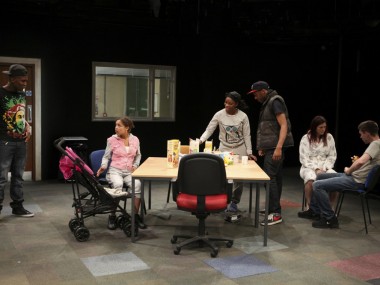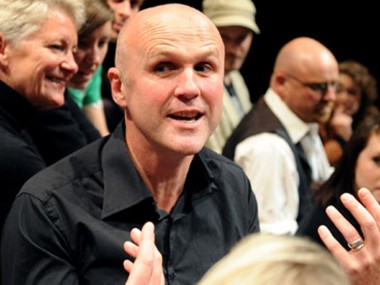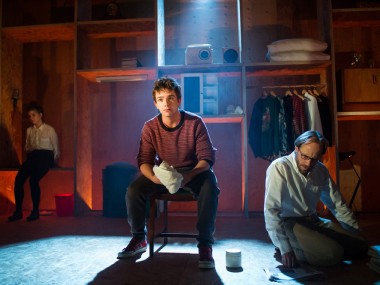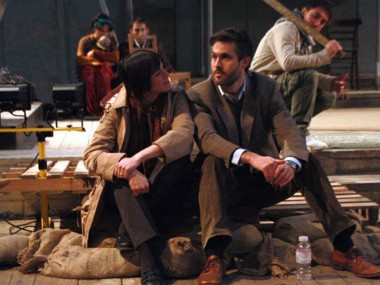Welcome Home, Soho Theatre
Friday 3rd February 2023

Willy Hudson comes from outer space! At least, that’s what the publicity for his show implies. Actually the truth is more mundane, if equally vivid: he’s a writer and performer from Exeter, and his Willy Hudson Ltd theatre company advertises itself as making “fabulous queer theatrical extravaganzas to make you go ooh, argh and oh f*ck”. I see. Anyway, his latest autobiographical solo show, Welcome Home, at the Soho Theatre, is a follow-up to his 2018 play Bottom, and covers the themes of sexuality, shame and religion. It is both a queer coming-of-age story and a miniature pop concert which features the music of Robbie Williams, audience participation and quite a lot of glitter, flashing lights, explicit videos and horror-movie gore. Oh and some extraterrestrial references.
After a bad break-up, Hudson returns to the parental home, where he finds his adolescent stuff still in his bedroom, and it provokes memories of his early teenage years. Looking at the photos of Robbie Williams on the sleeve notes of his 2000 album, Sing When You’re Winning, he was attracted by the singer’s naked body, which led the young teen to watch the “Rock DJ” music video, with its provocative striptease and flayed body images. But Hudson’s awakening sexuality is stifled by parental disapproval and religious condemnation from the church he goes to every week. Remembering these times, he explores not only his need to run away, but also his feelings of revenge.
On a set, designed by Anna Orton, which is dominated by both television screens and kitschy sci-fi silver-foil blobs and columns, Hudson begins by singing, dancing and gyrating, and then recounts a story about how his young self managed to get the best sofa seat to watch weekly episodes of Doctor Who, and — as two large images of stone angels appear — describes the repressive nature of his church. The overall tone is deliberately both surreal and silly, and his performance of Williams’s classic “Angels” involves an appeal to audience participation which, perhaps unintentionally, demonstrates how rock stars control their fans with the same strict conformity as any religion. Pop music is the opium of the people.
The whimsicality and weirdness continues with Hudson asking an audience member for a sock (to create a hand puppet), and moving among the seats to suggest a more intimate sense of conversation. It’s all rather do-it-yourself and messy, with the best bits being Susanne Dietz’s video material — which features sci-fi imagery as well as cute depictions of multi-coloured penises floating in the air — and Hudson’s occasional moments of real anguished feeling. His own strip and embrace of gore is less provocative than the extended and explicit video images of male masturbation, which do feel quite transgressive.
But although the central theme of how a strict religious upbringing can, even when the church’s leader is soft-spoken and reasonable, cause emotional damage is a good one, here neither the written text nor the performance go much beyond some banal observations. Despite Hudson’s occasionally charming chatting, this is a rather superficial show that prefers to flaunt its agonies to exploring the hidden depths of homophobia or teenage shame. This means that you can only enjoy the jokes and singalong with the music, rather than feel anything much for the performer’s teenage experiences and his suffering.
The surreal and chaotic anarchy is directed by Zach James, and Hudson does have an energy that pulses through the evening, which likewise does at some points feel a little dangerous. But the sci-fi theme — gay boy feels like an alien in his own home — is underdeveloped and the family scene — worried mother and finger-wagging father — is barely represented and never really investigated. In his post-apocalyptic punkish gear, Hudson spends about 80 minutes on this tour of his memories, thoughts and feelings with a raw honesty that some may feel uncomfortable with. Others, however, can just sing with him, laugh at the wit and savour the dribbles of hope that, at his best, he offers.
This review first appeared on The Theatre Times




